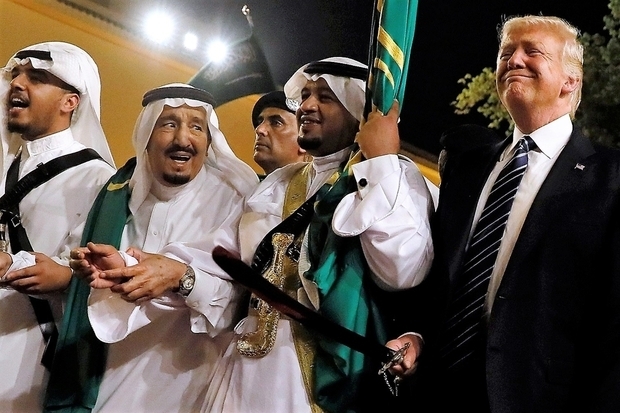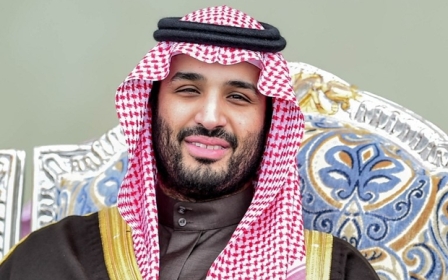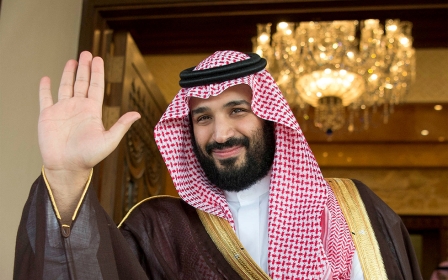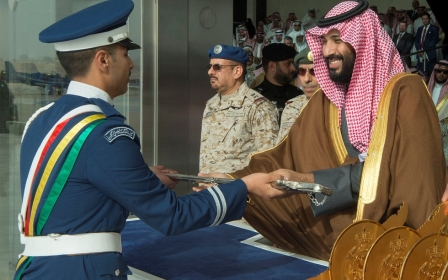Situation vacant: Trump leaves Saudi embassy empty ahead of bin Salman visit
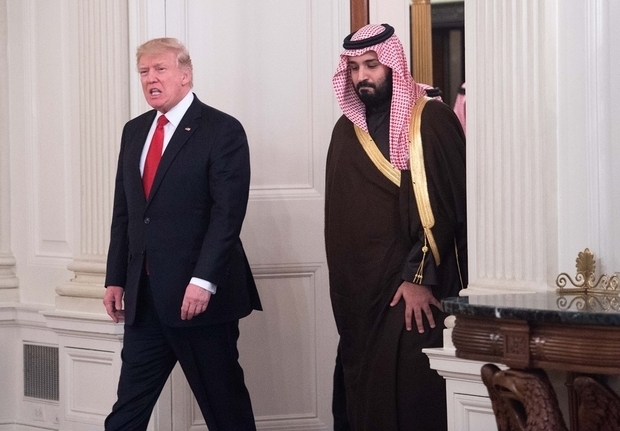
President Donald Trump has yet to appoint an ambassador to Saudi Arabia, leaving diplomatic relations in what one source described as a "black hole" as the key US ally pushes an aggressive foreign policy and its powerful crown prince turns domestic affairs on their head.
Mohammed bin Salman is expected to travel to the United States from 19 to 22 March, a Saudi government source told Reuters on Wednesday.
But there is increasing unease in diplomatic circles in Washington that the Trump administration has failed to appoint an ambassador to oversee the vital relationship with Riyadh, as part of a bid to deal directly with bin Salman.
The crown prince is chief proponent of the war in Yemen, and it was reported that Trump encouraged the palace coup that elevated the charismatic young royal to his current position.
Details of the long-planned US trip by bin Salman have still not been finalised, and Middle East Eye understands that the crown prince, who is overseeing a wave of reforms and “shock” therapy to modernise his kingdom’s cultural and political life, may no longer carry out a planned tour of technology firms on the US West Coast.
The US relationship with Saudi is a complete black hole at the moment
A diplomatic source in Washington
It had been reported that bin Salman will visit San Francisco in search of technology investors and also Houston, where he would meet with oil industry executives, but this now appears less likely.
“A delegation of Saudi diplomats is in Washington, but our embassy in Riyadh doesn’t know what’s going on. Neither does the US-Saudi Arabian Business Council,” a diplomatic source in Washington told MEE. “The US relationship with Saudi is a complete black hole at the moment, those who know don’t say and those who say don’t know."
They added: “The plan originally had been for him to visit six cities, including a visit to Boston and to Silicon Valley, where Saudi is working furiously with Microsoft, Amazon and Google for technology investment. He was also due to visit Houston because of the oil and Aramco, but it all appears to have been scaled back for now. Those visits might not happen.”
Washington and London are both vying to host the stock market listing of a portion Saudi state oil giant Aramco, which could be worth as much as $1.5 trillion. Bin Salman is due to visit London on 7 March before he travels to the US.
Saudi Arabia is among half a dozen countries in the Middle East without a US ambassador, including key US allies Egypt, Qatar and Turkey, prompting renewed concerns in Washington that Trump is undermining the State Department and instead using his son-in-law and key advisor Jared Kushner to run policy in the Middle East.
More than 400 days after Trump took office, the US has also failed to nominate an ambassador to Jordan, a key player in the Palestinian peace process. The UAE and Morocco are also currently without ambassadors.
Trump has given plenty of attention to the Middle East since he took office, visiting Saudi Arabia and placing Kushner in charge of handling the stalled Israel-Palestine peace process.
Saudi Arabia is currently engaged in shock therapy to combat Islamist militancy in the kingdom, and is giving giving greater rights to women while reducing the power of the religious police, in what bin Salman has called an attempt to establish a more “moderate Islam”.
The shift has been welcomed by Washington and London, while rights groups have expressed concern over on-going human rights abuses in the kingdom.
Nobody at the wheel
Dan Shapiro, an American ambassador to Israel under President Obama, told MEE: “It’s madness to try and conduct complex diplomatic maneuvers like offering a peace plan, managing our deployments in Syria and increasing pressure on Iran without ambassadors in almost any of the capitals of our key allies in the region”.
Shapiro said the lack of diplomatic movement from the White House could be an “intentional effort to cripple” the State Department and prevent it from having any role in the Middle East peace process, the conflict in Syria or agreements with Saudi Arabia.
Secretary of State Rex Tillerson has complained more than once about the perceived encroachment on his turf by Kushner, as well as by US Ambassador to the United Nations Nikki Haley and National Security Adviser HR McMaster. “We can’t have four secretaries of state,” Tillerson has said.
Kushner's role was called into question on Tuesday after he was denied access to top-secret intelligence after having his security clearance downgraded.
The reason for the lack of ambassadors in key roles dates back to Trump’s first day in office when he fired all ambassadors politically appointed by President Obama. Ambassadors were given no notice period and ordered to leave their offices by midday on 20 January 2017.
In the absence of ambassadors, senior officials step in to head up embassies. However, these officials are not permanent appointees and US law limits these temporary office-holders to 300 days in office.
Help wanted: Ambassadors
But more than than 400 days have elapsed since Trump took office, and acting officials in the State Department are hitting that limit.
Perry Cammack, a fellow at the Carnegie Endowment for International Peace and former advisor to secretary of state John Kerry, said the Gulf crisis was a clear example in which a lack of US ambassadors in the Middle East had inhibited Washington’s ability to respond to a string of crisis that have hit the region.
He said: “We had a situation where the president was saying one thing and Tillerson and Mattis [the US Secretary of Defence] were saying something else. In this situation effective ambassadors could have coordinated with their colleagues in the Gulf to help bridge the gap across the region to help ensure the US administration spoke with one voice. That didn’t happen.”
Cammack said he saw Emirati officials gravitate to the president’s position, while Qatari officials were quicker to move to Tillerson’s position on the crisis. “You could see they were naturally jumping to hear what they wanted to hear,” he said. “When you have mixed messages from Washington, you need the most senior figure on the ground bringing clarity. When you have two contrary rival policies, you really have no policy at all”.
Aaron David Miller, vice president at the Woodrow Wilson Center and a former State Department analyst, told MEE that the ambassador trend “clearly reflects a hollowing out of the State Department”. He said: “It has created an acute vulnerability and is potentially leaving host governments confused as to US policy… a thousands flowers have been let to bloom instead.”
He added: “The broader point is that the State Department is essentially closed for the season and we have a president who frankly doesn’t care for the secretary of state.”
Speaking last week, Tillerson rejected suggestions that the lack of ambassadors was part of a plan to undermine the State Department’s influence in the region.
“There’s been no dismantling at all of the State Department. We’ve got terrific people, both Foreign Service officers, civil servants, that have stepped into these roles around the world… our foreign policy objectives continue to be met."
Miller also said that on “sensitive issues”, such as the Iran deal or the Palestinian peace process, policy making has historically been driven from the White House and Pentagon, not the State Department.
“In the past, US ambassadors in Israel have literally been informed of US government policy by Israeli officials,” he said.
According to US media reports, 41 out of 188 embassies and international bodies still lack an ambassador. Shapiro, previously a senior official for the Middle East at the US National Security Council, said the lack of ambassadors in the Middle East could simply be down to “utter incompetence” in the White House, which is to blame for the lack of nominations.
“Either way, the lack of ambassadors is highly damaging to US interests and our ability to influence the region,” he told MEE.
Kristian Ulrichsen, an associate fellow at Chatham House, told MEE that the work of embassies “continues” without ambassadors, but that it sends a “poor signal to the rest of the world about the value the current administration places on the patient work of diplomacy in solving the most complex and challenging issues of our time".
The White House did not return MEE's request for comment regarding the ambassadorial vacancies in the Middle East. A State Department official said that the administration “remains hard at work” in the region.
Middle East Eye propose une couverture et une analyse indépendantes et incomparables du Moyen-Orient, de l’Afrique du Nord et d’autres régions du monde. Pour en savoir plus sur la reprise de ce contenu et les frais qui s’appliquent, veuillez remplir ce formulaire [en anglais]. Pour en savoir plus sur MEE, cliquez ici [en anglais].


